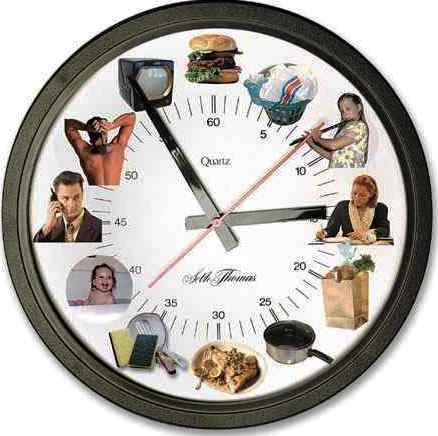Assalamualakum and hello to all blogger. My next post is about time.This time i want to share to all blogger how to manage time.Maybe some of you have problem to manage your time.So this some of tips to solve your problem.Hope you all enjoy your reading.
These days, time seems to be at a premium. We have devices that keep us constantly connected with work, with friends and family, and sometimes even with complete strangers. As a result, it's easy to get distracted. If you're like most of us, you have a lot to accomplish. We'll show you a great way to do just that!

EditSteps
- 1Make a list of the tasks you need to accomplish. Before you can manage your time, you need to know what it is you must manage. A list of tasks, from the mundane to the critical, will help you get a handle on what needs to get done.
- Assign realistic priorities to each task:
- Priority 1: due today or tomorrow
- Priority 2: due in one week
- Priority 3: due in one month
- Priority 4: due next year
- Priority 1: due today or tomorrow
- You can further prioritize tasks within this grouping by adding a decimal place. For example, a Priority 1.0 task needs to be done immediately, whereas a Priority 1.5 task simply needs to be done by the end of day.
- Assign realistic priorities to each task:
- 2Balance your effort. Work on small portions every day, starting with the most important tasks first.
- Do the daily tasks. Concentrate on what is at hand, then move on to the next daily task. Once daily tasks are completed, mark them as such, and proceed to weekly tasks.
- When the weekly tasks are complete, work on the monthly tasks, and when those are complete, work on the yearly tasks.
- Make one of your final daily tasks the completion of tomorrow's task list.
- Do the daily tasks. Concentrate on what is at hand, then move on to the next daily task. Once daily tasks are completed, mark them as such, and proceed to weekly tasks.
- 3Focus on your most productive time of day. Some people work better in the morning, and some are more focused in the evening.
- 4Manage time in increments. Play a game with yourself by competing against the clock.
- Work in fifteen minute, half hour or hour intervals.
- Give yourself a time goal to complete a portion of a task or the entire task.
- Work in fifteen minute, half hour or hour intervals.
- 5Take a break. Clear your mind and refresh yourself to refocus.
- Decide beforehand on a 5, 10 or 15 minute break and stick to that decision.
- Breaks provide incentive by giving you something to look forward to.
- Decide beforehand on a 5, 10 or 15 minute break and stick to that decision.
- 6Keep track of your progress.
- Cross things off the list as they are completed.
- You'll feel more relieved and relaxed just by getting through the daily tasks. Not only will you be getting things done, finishing tasks will give you a sense of accomplishment and spur motivation.
- Cross things off the list as they are completed.
- 7Reassess the list. Rewrite and prioritize your list on a regular basis.
- Add new tasks to the list. This should be done on a daily basis, especially when you are just getting started with a time management regimen.
- Eliminate or adjust tasks that are completed, or fall in priority.
- Delegate tasks to others. Contrary to popular belief, you don't need to do it all. You can be much more effective if you can delegate tasks as necessary.
- Use technology to complete tasks more quickly, efficiently or accurately. Today's mobile technology features dozens, if not hundreds of apps that will help you manage—and even accomplish—your tasks efficiently.
- Add new tasks to the list. This should be done on a daily basis, especially when you are just getting started with a time management regimen.
- 8Leave time for fun.
- While there are times when we just need to power through a large project, it's important to give yourself time to let loose. Not only will it refresh your mind, it's good for your body, too. It doesn't have to be a lot of time but make sure that you do!
- 9Sleep for 6-8 hours every night.
- Getting the proper amount of sleep will help keep you alert and energetic, able to think clearly, and function at a high level.











